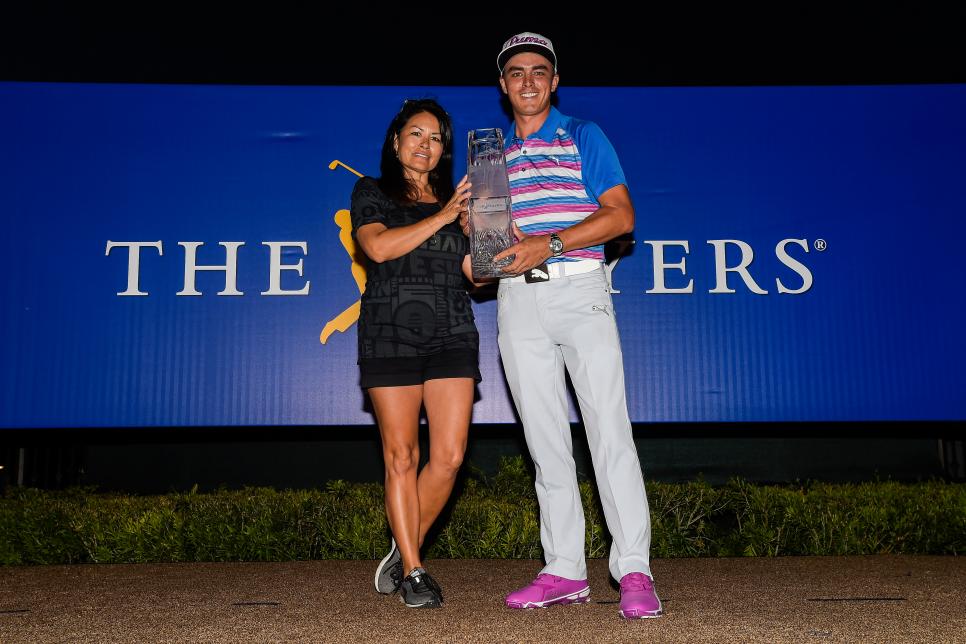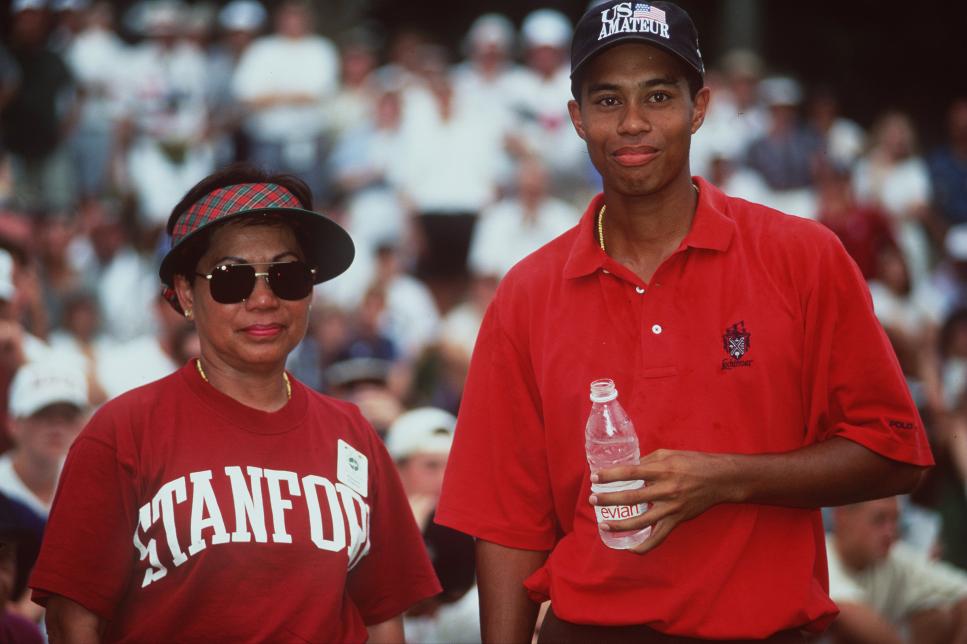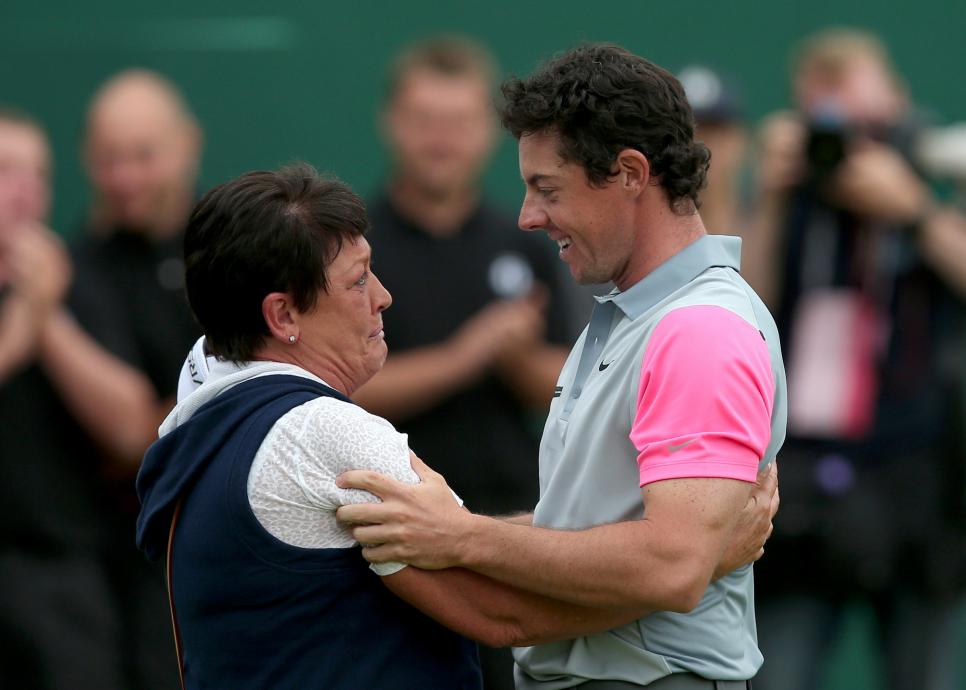Mothers tend to get short shrift in professional golf. Tour pros don’t mouth “Hi Mom!” like athletes in other sports, and they usually say their personal all-time foursome would include Dad.
Consider the various types of famous golf fathers. There’s the tough-loving disciplinarian (Deacon Palmer), the best friend (Col. Robert P. Jones, Charlie Nicklaus, Earl Woods) and the from-the-cradle teacher (Davis Love Jr. and Mike Furyk). And it should be noted that for those who are fortunate enough to qualify, there is no more eagerly anticipated event among participants than the year-end PNC Father/Son Challenge.
But yesterday was Mother’s Day, too often the one time a year they get their due. Through three rounds at the Wells Fargo Championship it looked as if Rickie Fowler was going to reprise what he did last year at the Players: be a perfect son and honor his mom, Lynne, with the trophy. Alas, he fell short, but the eventual winner, James Hahn, made sure to thank his mom after his playoff victory.
It was a feel-good moment, but not without a bit of collective guilt. Because any child who has ever played competitively (as well as the father of that child) knows that the contribution of mothers is too often forgotten in golf.
Indeed, mothers most important roles might be the necessary counter to the excesses of the vaunted father-son relationship. Most psychologists believe the shame-based toughening that fathers and male authority figures often impose on boys creates a false manliness that masks fear. Meanwhile, a mother’s talent for allowing a son to feel safe and accepted is what builds confidence and a freedom to fail, the foundations of real bravery.
“Golf is a high ego-risk endeavor. It’s just you and your score,” pioneer sports psychologist Dick Coop told Golf Digest in 2007. “A young golfer really craves unconditional love, but fathers are almost trained not to give it because they can see it as encouraging weakness. But mothers are generally more able to do it, and it can make a huge difference in how a young golfer grows.”

Arnold Palmer, golf’s most classically masculine figure, was crucially shaped by Doris Palmer, whose warmth and ease with people made her perhaps the most important mother in the golf history.
“My mother was a very gentle, generous person, but I never felt as if I was being soft by going to her,” Palmer said in 2007. “I sought her because she was the balance I needed to my father, who was tough and hard-core and refused to give me a compliment. I was always afraid to lose because of my father’s reaction, but I never felt that way about my mother. No matter what, she was the one who always understood. All that was so important—much more important than I realized at the time.”
In his 2000 memoir, A Golfers Life, with James Dodson, Palmer said of his mother, “almost anything I did seemed to thrill her.” Which would have drawn a nod from Dr. Freud, who wrote: “If a man has been his mother’s undisputed darling, he retains throughout life the triumphant feeling, the confidence in his success, which not seldom brings actual success with it.”
It’s likely Francis Ouimet got that feeling from his mother, Mary. As presented by Mark Frost in his book, The Greatest Game Ever Played, the young Ouimet’s father was a harsh disciplinarian who considered his son’s aspirations in the game frivolous. But Mary could see “the dreamer in Francis needed looking after,” and took her 7-year-old son to a Boston department store in 1900 where the greatest player in the world, Harry Vardon, was making an appearance. Thirteen years later, Ouimet beat Vardon and Ted Ray in the U.S. Open at Brookline.
Sam Snead revered his mother, Laura, who was 47 when she gave birth to Sam, the last of her six children. From her, he inherited physical strength—she could throw a 100-pound sack of flour onto a rack—and a country shrewdness that was the hallmark of his personality. “I’d like to have had all my characteristics and character from my mother,” Snead told Al Barkow in Gettin’ to the Dance Floor. “We always went to my mother.”

In more recent times, mothers have typically taken a more active day-to-day role in the development of their sons and daughter’s games, as future pros keep starting younger. Invariably, it’s the mothers who get up in the wee hours to drive kids to tournaments, with the little one sleeping in the backseat before the sun rises. They commonly walk every hole, offer affirmation when things go well and commiserate when the game wounds.
Golf’s current Big Three have all had influential mothers. Christine Spieth has given Jordan valuable perspective on competition through her experience as a college basketball player and taught a greater perspective through her parenting of his little sister with special needs, Ellie. Rosie McIlroy worked nights in a 3M factory, those wages used to fund Rory’s junior golf. And Dening Day, seeing 12-year-old Jason lose his bearings after the death of his father, sold the family home, borrowed from relatives, cashed in a life-insurance policy and increased her hours at a meat-packing plant. In so doing, she scratched together money needed to send Jason to a highly regarded Australian boarding school, where he began a disciplined road that’s culminated in becoming World No. 1.
Fowler grew up close to his mother and remains so. While walking along with the pre-teen Rickie when he began playing junior golf in Southern California, Lynne would take a club away “for every cuss word or every tantrum” (Tida Woods used to assess a stroke for the same “violations” to the young Tiger). Says Rickie: “She may only be 5 feet, but she’s still got the strength to take me down.”
And, like so many unsung mothers, the strength to build up.
